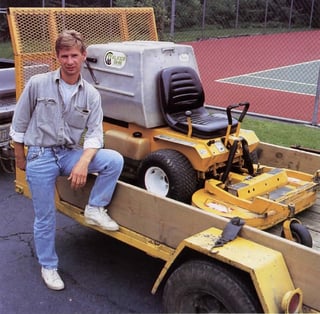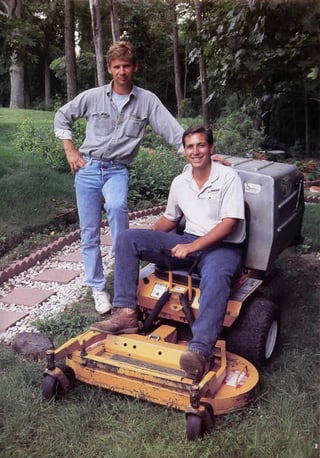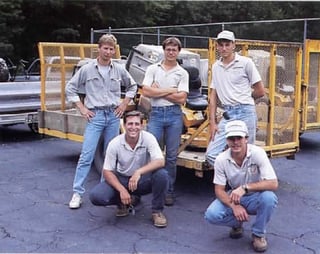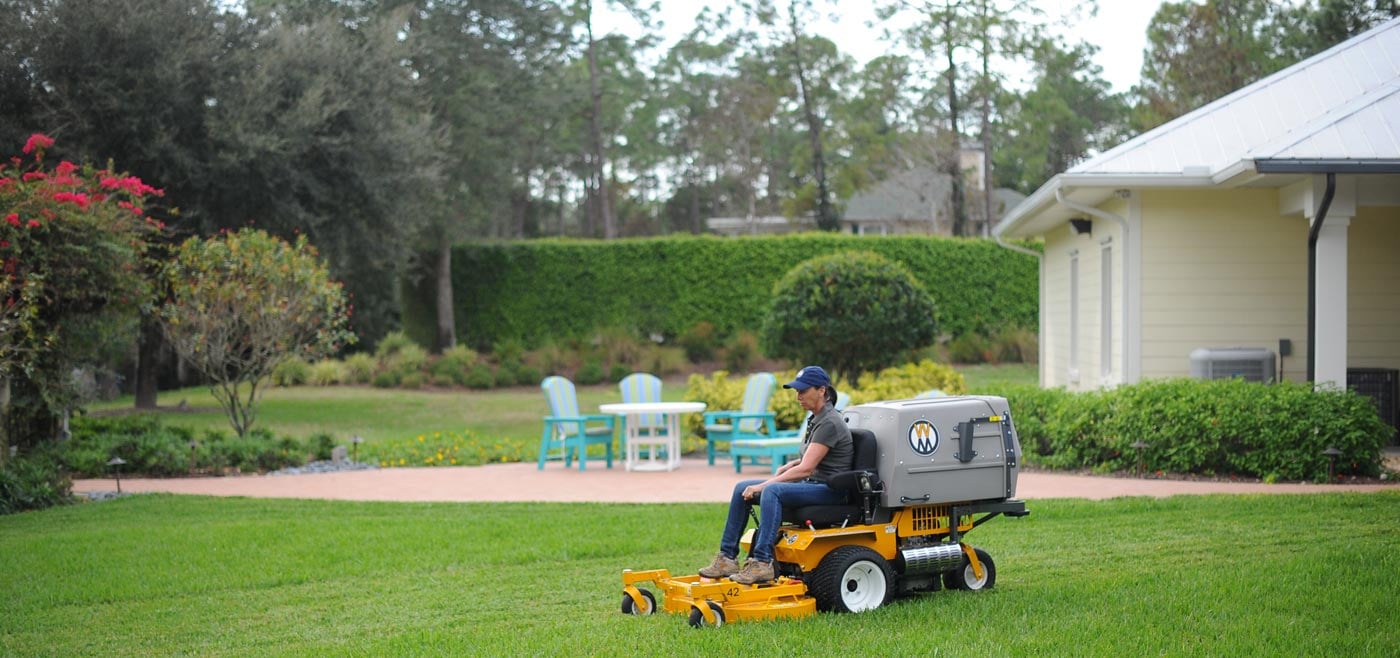Make no mistake about it: John Flucker is in it for the money.
 And at age 27, he's made impressive progress toward his goal to be the largest full-service landscape contractor in the Pittsburgh area. His 6-year-old company, Turfmaster, services one of the most prestigious condominium complexes in the area, the Trimont.
And at age 27, he's made impressive progress toward his goal to be the largest full-service landscape contractor in the Pittsburgh area. His 6-year-old company, Turfmaster, services one of the most prestigious condominium complexes in the area, the Trimont.
"My passion is to be a businessman and not a landscaper," Flucker says, non-apologetically. To some industry purists, that may sound like heresy. But not to Flucker. Because to be the biggest, he reasons, you need to be the best.
Flucker's quest to be the biggest and the best was born in 1986 while he was working part time at Sears. One day, in the employee lounge. He saw an article about a young man who was making it big in landscape maintenance.
Flucker knew nothing about landscape maintenance, but he was anxious to better his position in life. Having recently gotten out of the service, he was enrolled· in a two-year business program at a community college. His previous work experience included a stint as a chemical salesman and as an assistant manager of a nursery.
Grass cutting seemed like a good way to get some cash while he attended classes. So he picked up a couple of Sears mowers and started knocking on doors and posting fliers in supermarkets.
So far the story sounds pretty common. Flucker trucked around in his Volkswagen Rabbit, charging $5 to $10 an hour. Then opportunity rang, literally speaking.
Opportunity rings
Flucker got a call from a condominium association manager who saw his ad in the Yellow Pages. The manager was anxious to get someone right away, and wasn't interested in putting the job out for bids. Flucker said he'd do it.
"The job scared me," he recalls. "It was probably the first time I ever set foot on a condo."
With little idea what type of equipment or manpower he'd need to handle the 80-unit complex, Flucker hurried to a local power equipment dealership. He leased a pair of midsize walk-behinds.
With two helpers, he began his initiation into the strenuous world of multifamily property maintenance. The physical strain was much harder than the single-family properties. But he managed to keep the property serviced to the manager's satisfaction, and he has kept the contract ever since.
Flucker saw a gold mine in condo maintenance. The trick was to do as much high-quality work as quickly as possible. "To this day, I am an efficiency fanatic," he says. ''I'm always looking for the better routing system or a better way of doing something at a condo complex."
During 1987, when he was servicing that first condo complex, his knowledge of equipment was elementary. But that didn't stop him from seeking more work. That first job provided him with a reference in seeking other condo jobs.
Flucker also solicited restaurants, banks and other roadside properties that had high public visibility. He figured such accounts would provide good advertising to prospective customers.
The equipment search
Having the best equipment became a priority. In his first two years servicing condo properties, Flucker experimented with various intermediate and midsize walk-behinds. He found them tough to use on the Pittsburgh area's steep hills. "We don't take care of one condo complex that doesn't have at least one hill that is difficult to maintain," he says.
The intermediates were not easy to maneuver around shrubs and flower beds. "I don't have any accounts where I have big open fields with no obstacles," he says, referring to the chairs, swingsets, tables and pools, many of which are installed on the premises.
Flucker's search for better equipment seemed never-ending. "They (intermediate walk-behinds) did a nice job as far as appearance of the cutting was concerned," he says, but they couldn't bag enough clippings as quickly as he wanted.
Maintenance costs were a regular drain on his cash flow and productivity. "We were going through belts on a weekly basis with the walk-behinds," he says.
Maneuverability was limited. Flucker notes that some of the units had no reverse drive.
"The other main issue was operator fatigue," he adds.
 A lucky acquisition
A lucky acquisition
In January 1989, Flucker came across an opportunity to buy out one of his competitors. It seemed to be a good idea, since it would provide more customers and equipment for his young company. But at the time, he had no idea just how good a move it would be.
Among the equipment he gained in that acquisition was a Walker riding mower with zero turn radius. Flucker had never seen a Walker unit before, so he took it out in the field to see how it worked. The unit had not been well-maintained, so he called the manufacturer's headquarters in Fort Collins, Colorado. Bob Walker, company president, answered the phone.
"The thing that impressed me is that he (Walker) actually answered the call," Flucker says.
But Flucker was even more impressed - with the machine's performance - after he received and installed the new parts Walker sent him free of charge.
The zero turn riding mower was very maneuverable, fairly light, had great bagging capability, was easy to load onto a trailer and took up less space than the intermediates. In addition, employees found it easy to learn how to use.
This all translates into great productivity on Pittsburgh's steep terrains.
"The Walker really has worked well in that environment because of the adverse terrain many of the condos in the Pittsburgh area are set on. " Flucker says.
Turfmaster's productivity has more than doubled with the Walker mowers. Maintenance crews have been able to get the units running on a customer's property one minute after they pull into the driveway.
The superior productivity gave him a higher level of confidence in bidding for more condo work. Some competitors take a day to do what Flucker's crews can do in three hours.
"We can charge as much as somebody that might take twice as long to do the work," he says. Besides the Walker riding units, Flucker has a few rotary walk-behinds for narrow turf areas, and two midsize units for really steep hillsides.
 The labor challenge
The labor challenge
Having the right equipment is only part of the battle, Flucker notes. Equally important is having the right employees. Flucker feels he has struggled with this challenge as much as any contractor. He notes that five good employees are more valuable than nine mediocre ones.
As a practice, he hires well-groomed, clean-shaven people with short hair. On the job, they wear uniform T-shirts and are expected to behave in a professional and courteous manner. "We try to be as professional as we can be," he says.
The ground rules are explained to the employees in the beginning, and those who don't abide by them don't stay.
Will he realize his goal of becoming the biggest full-service landscaper in Pittsburgh?
Like other contractors, Flucker has learned that good design capability holds the key to lucrative maintenance contracts. He works with a capable landscape architect who has helped him win a design award from a local garden club.
This year, Flucker won the bid on the Trimont condominium complex overlooking Three Rivers Stadium. In the running were some firms who had 20-year veteran landscape architects. "We go for the people that are insistent on high quality," Flucker says.
"We get a premium price for what we like to think is a premium service."




 Site Search
Site Search



